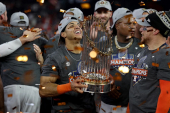|
BWV posted:Sorry for so many but it turned out I really wanted to learn more about modern hockey strategy and tactics. 1. Teams are using analytics more, but it's hard to say because a lot of it varies by team. Like baseball years ago when some teams were all in and some were holdouts rather than now where there's a baseline expectation that everyone knows. There was one guy that just got hired by the Athletic that was one of the early analytics bloggers who then went to work for a team. The main reason he left/was let go was that he was originally hired because he could explain analytics so he got to talk to management and give recommendations based on the stats in an understandable way. But over the years, management learned and just started wanting the data to do their own analysis so he wasn't needed anymore/got regulated to doing boring reporting. 2/3. This is hard to say too because a lot of the data teams have is private. Unlike baseball where you can track just about anything, a lot of important data comes from player/puck tracking that teams do and keep private. There's some things that have changed recently. Teams are much quicker to pull the goalie. Smaller, fast dudes are coming into favour over big strong slow guys. Big hits are less common now both because of safety and realizing a big hit which often takes the hitter out of the play too than a simple pokecheck to steal the puck that leads to a turnover. Defence is getting more credit for doing things that actually prevent goals rather than traditional stats and big flashy defence. Like traditional defence rewarded shot blocks and hits as the keys to being a good defender as those are big flashy plays that people notice and they obviously block a shot or kick the guy away from the puck. But they are also bad because if you block a lot of shots that means the other team is taking a lot of shots. So a lot of defensive analytics try to identify guys that actually cause turnovers before a shot by breaking up passes or being more effective at clearing the zone. This leads back to the smaller guys thing as teams realize not every defenceman needs to be a 6'4 monster that levels everyone. 4. In game, icetime is probably the biggest one. Unlike basketball where you have an idea of who's going in when, there's a lot more on the fly adjustments and lines that start a game together might not finish. There's a lot more on tactics that's hard to get into everything but one big thing is breakouts and zone entries. Basically how you want your guys getting the puck out of your end and into the opponents or a more detailed breakdown of your dump and chase vs. skate in choice. Controlled exits/entries (passes or carrying it) is generally better than dumping it and hoping for the best, but you can really see teams that love a long pass from a defenceman to a streaking forward vs. a slower approach of shorter more accurate passes. Or teams that funnel it to their best players to skate it in. Teams often have set plays that they try or at least general systems like a forward might know if Defenceman A recovers the puck, he's supposed to race out and try for a big breakaway pass attempt while if Defenceman B gets the puck, he's supposed to come back and help him get the puck out because B is a weaker passer.
|
|
|
|

|
| # ? May 5, 2024 15:14 |
|
Line matching is another tactical decision hockey coaches and teams have to make. Do I match my best defensive players against their best scoring line? Do I just match my best scoring line against their best scoring line and hope for the best? Zone starts also matter. If you're starting your shift from an offensive zone draw, you're more likely to be able to create offense than if you started your shift in the defensive zone. So coaches might use these sorts of situations to determine ice time as well. For instance if it's a defensive zone draw maybe put out your defensive players because you want to make sure that if the other team wins the draw your team will be in a good position to deny them an offensive chance. Conversely if you have an offensive zone draw you might put out your best offensive line with the goal of giving that line the best possible chance to create offense. Different coaches/teams handle this in different ways. The old Vancouver Canucks coach, Alain Vigneault, was pretty well known for deploying his top offensive players (the Sedin twins at the time) as much as he could with offensive zone draws. Not every coach does it to quite that degree though, and while zone starts matter there's still also the consideration of what line you're going up against. So if it's a defensive zone draw and the other team puts out their top line, that doesn't automatically mean you're putting out your fourth or third lines just because it's a d-zone draw. Matchups and zone deployments are all considered when coaching.
|
|
|
|
I remember a few times over the years in hockey of hearing about teams playing a defense that no one could score against to the point it was unfun to watch. Did everyone just copy that, watering it down, or did rules get rid of it? This would be late 90s and I feel like I heard something about it in the 10s.
|
|
|
|
Rick posted:I remember a few times over the years in hockey of hearing about teams playing a defense that no one could score against to the point it was unfun to watch. Did everyone just copy that, watering it down, or did rules get rid of it? This would be late 90s and I feel like I heard something about it in the 10s. Yeah itís called the dead puck era and lasted from likeÖ 97 to 04? Basically the re-introduction of the tag up offside rule, enforcing holding and interference more, and limits on goalie equipment dimensions ended it. It was common to just set up defensively in the neutral zone in this era and trap the other team. The sens under guy boucher did this a few years back and it brought them a level of success they didnít really expect but was easily countered the next year.
|
|
|
|
my morning jackass posted:Yeah itís called the dead puck era and lasted from likeÖ 97 to 04? Basically the re-introduction of the tag up offside rule, enforcing holding and interference more, and limits on goalie equipment dimensions ended it. Honestly every team still traps or does a variation of it (1-3-1) etc. Especially when defending leads. Hockey is just more high skill than ever and teams have found various ways to beat the trap. The trap is still highly effective though, and you will find teams typically sitting in that structure defensively.
|
|
|
|
Specifically I believe it was the Devils who really employed the trap to great success, so of course everyone copied them The Lightning employing it a while back and it led to this absurdity https://www.youtube.com/watch?v=4VV1PrbkK3E
|
|
|
|
Ace Jameson posted:Specifically I believe it was the Devils who really employed the trap to great success, so of course everyone copied them Okay, I just reread the last few posts and I'm still confused. Are the Flyers not bringing the puck up the ice because the player will be called offsides or something, or would it just be very tactically disadvantageous to do so with the other team set up like that? My hockey watching experience consists of like 4 live Flyers games, and I have no idea what I'm looking at here.
|
|
|
|
DJ_Mindboggler posted:Okay, I just reread the last few posts and I'm still confused. Are the Flyers not bringing the puck up the ice because the player will be called offsides or something, or would it just be very tactically disadvantageous to do so with the other team set up like that? 100% the latter. The trap that Tampa is employing relies on clogging up all the lanes the Flyers could use to move the puck. So the Flyers are waiting for a forechecker to come chase the puck to make space for a play, but Tampa's system is passive by design. That's what causes the impasse.
|
|
|
|
It's worth realizing for hockey analytics that the NHL has better stats it only shares with teams. There's data the teams have access to that the public absolutely doesn't, so some of the public stuff is very openly an approximation of the data the teams are actually working with. Why is the definition of a catch so contested in the NFL to the point it seems to be a joke?
|
|
|
|
Arivia posted:Why is the definition of a catch so contested in the NFL to the point it seems to be a joke? Because its a hard thing to litigate when you get into the details, but also because the NFL cannot stop chasing a rule that will fix the last controversy without managing to introduce a new one. (note: the NFL can eat my rear end for blocking play of their youtubes on here but I encourage you to click through.) Used to be it was pretty much mostly up to the refs. There was this nebulous concept of a "football move" where you had to catch the ball, have possession, and do a football move and it was a catch and everything after that moment functioned the same as if you got a handoff: if you dropped the ball it was a fumble, if you hit the ground and the ball popped loose it was not (because the ground cannot cause a fumble) but it was still a completion, and so forth. The NFL in its infinite wisdom decided that they wanted to rid football of the subjectivity around "football move." Arguably a good idea! So, in 2007, the catch rule was changed to require possession, two feet down, and that's it. If you don't get two feet down first, but land some way else (like on your back or whatever) you gotta maintain possession through the contact with the ground. Simple right? So then in 2010 this happens (skip to 2:45) https://www.youtube.com/watch?v=NRQqN6UsRys&t=166s Everyone on earth - the announcers, Lions, Bears (oh my), fans, literally everyone except the refs knew this was a touchdown. Under the old rule it probably would have been, too, because controlling the ball with one hand like that seemingly constitutes a football move. We know this because EVERYONE hated this ruling except Bears fans and even they were sheepish about it. This requires the NFL to, for that season, come out an try to explain about going to ground which satisfies essentially no one. So they clarify the rule for 2011. I managed to find the 2010 rule (which I believe was unchanged from 2007) and the 2011 rule, both of which follow, with 2011 changes bolded. 2010 rulebook posted:Rule 8-1-3 2011 rulebook posted:Rule 8-1-3 If you're thinking "gosh fast cars, 'act common to the game' sounds suspiciously like the lawyer version of 'football move'," well, so did everyone else. But, hey, the purpose of lawyerly language is to remove ambiguity and take the human element out, right? We should be good, yeah? Turn away, Cowboys fans: https://www.youtube.com/watch?v=1khK6is-Bfs So back to the drawing board, as, once again, everyone would have told you this was a catch except the 5 people who had the actual power to tell you it wasn't one. They came up with this: 2015 NFL rulebook posted:To gain possession of a loose ball that has been caught, intercepted, or recovered, a player must have complete control of the ball and have both feet or any other part of his body, other than his hands, completely on the ground inbounds, and then maintain control of the ball until he has clearly become a runner. A player becomes a runner when he is capable of avoiding or warding off impending contact of an opponent. If the player loses the ball while simultaneously touching both feet or any other part of his body to the ground, there is no possession. This rule applies in the field of play and in the end zone. "gee fast cars that doesn't sound like it clarifies anything at all" you're right, theoretical person reading this post! It's stupid as hell and so they changed it, again, as near as I can tell in 2018. I believe this version is basically still in effect in 2022 and its annoying to track down old NFL rulebooks so for our purposes we'll say it is. As of right now the catch rule is: 2022 NFL rulebook posted:To gain possession of a loose ball that has been caught, intercepted, or recovered, a player (a) must have complete control of the ball with his hands or arms and (b) have both feet or any other part of his body, other than his hands, completely on the ground inbounds, and, after (a) and (b) have been fulfilled, perform any act common to the game (e.g., tuck the ball away, extend it forward, take an additional step, turn upfield, or avoid or ward off an opponent). It is not necessary that he commit such an act, provided that he maintains control of the ball long enough to do so. This rule applies in the field of play, at the sideline, and in the end zone. So after all that angst and lawyering and rules changes we're back to a football move but you're not supposed to call it that. The NFL, everyone.
|
|
|
|
i just want you to know that i deeply appreciate all the research and links you provided for that post however the end result is that i feel like i just met Roger Goodell in Innsmouth and he handed me the necronomicon ia ia touchdown ftaghn
|
|
|
|
I know nothing about football, but drat that was a catch. E: As for an actual question, why is so much stock placed in draft combine results for the NFL? In other sports it's a general way to compare guys and you might see some surprising results, but for the most part it doesn't seem to significantly affect rankings. In the NFL a guy having a good forty yard dash can rocket him up the rankings. How is a weekend of testing superior to oftentimes 3-4 years of on field results at the College level? I realize there are significant disparities in the quality of College Teams and leagues, but it always seemed bizarre to me. ThinkTank fucked around with this message at 14:14 on Oct 29, 2022 |
|
|
|
Thanks for all the replies explaining hockey tactics. Seems like teams have a lot of things they can do to change their play style. Will give me more to think about when watching the Leafs lose in the first round.
|
|
|
|
ThinkTank posted:
The combine is weird because as with anything in the NFL, it's a media circus. Everything with the NFL is amped up to 11 for broadcast, and the combine's no exception: it's a lead up to the draft so it's the tentpole that holds up 24/7 draft analysis shows for a week or two. The coverage would certainly have you believe that there's an incredible amount of stock placed in draft combine results, because otherwise why would these people be talking about it all the time for weeks?!??! But for actual teams inside the building I think it's not quite as major as the media would have you believe. The exact details of the combine matter more on the outliers. Maybe this guy's measurables pop in a way that his tape doesn't - a cornerback who got burned over the top a lot in school runs a 4.4 40, maybe it's worth taking a second look and seeing if the tape performance is much more about how fluidly he switches his hips or because he's got some bizarre scheme where he's got to think through everything before he does it. Or, maybe a guy with pretty good tape tests just absolutely dismally - is he having an off day? Does it speak to his character that he allowed himself to have an off day for the loving combine that could determine whether he makes millions? Or hell, maybe the measurables just kind of confirm what you're seeing on the tape. Either way, nobody's really saying "well we projected this guy to do 25 bench press reps and he did 24 so that's gonna drop him a round". It's enough of a circus that you'll sometimes see top (or even not all that top!) prospects turn down an invite, or go but only do some of the events and not others. Lamar Jackson didn't do running events because he wanted to drive home that he's a quarterback and nothing else. Finally, the extent to which the combine really does matter a lot is the degree to which it fuels and validates insane boomer scout brain. They also do team interviews of prospects behind closed doors at the combine; these interviews are reportedly part questions about football and part things like asking invasive and rude and bigoted personal questions because well insane boomer scout brain. It's a land of contrast.
|
|
|
|
ThinkTank posted:I know nothing about football, but drat that was a catch. There is very much a debate between analysts and teams over the very thing you mentioned, how much weight should be given to a weekend of drills vs potentially years of game tape. Teams/front offices and fans will see that raw athleticism at the combine from various drills and think that they will be the ones to fully maximize it and totally translate in the NFL, so lot of people are just looking at the pure potential and upside and that moves those guys up the draft boards. Some of it comes from players being used very differently in college than they are in the NFL, as the two have significant differences both in schemes and talent level. Players who are on bad teams in college or don't get as much media attention can use the combine drills to be noticed by teams and fans. There have also been several cases where players train specifically for the combine, knowing it'll rocket them up in the draft process. Defensive end Mike Mamula in 1995 was the first big case of that, where he trained specifically for the combine and it was a major reason he ended up being the 12th overall pick, but ultimately had a fairly pedestrian career and wasn't anything special. In 2012, defensive tackle Dontari Poe exploded in national attention after having an amazing combine, running a 4.98 40-yard dash as a 350lbs defensive tackle had every analyst do a doubletake and start reexamining him, and even Obama commented on him in some interview at the time. He got probably overdrafted (11th overall pick), but still went to a few Pro Bowls and had some good seasons before. It's worth mentioning that the value put on the combine has exploded in the last 20~ years since that's when it's been on TV and become a major event, not unlike what happened to the NFL Draft when ESPN began airing that in the 80s. Prior to that, you maybe saw a few highlights or clips of combine drills as part of draft coverage (There are well known clips of Tom Brady at the 2000 combine, for example), the end numbers would get posted in draft preview stuff (Online, or books back when those were a thing) and aside from "faster is good", it was mostly just a league/scout thing. It wasn't on TV until NFL Network started airing in 2004 to basically fill time during a perceived slow part of the NFL calendar at the end of February after the season ends, but before free agency starts. Half the reason to watch it in those years was just the NFL Network guys goofing around, leading to stuff like Rich Eisen annually running the 40-yard dash in a suit or Mike Mayock doing Parliament Funkadelic and Rapper's Delight. Its become so popular that within the last few years the league started allowing fans to attend and watch it live, moved it to primetime for more TV viewers, and even ABC will simulcast a few hours of it on network TV. fartknocker fucked around with this message at 15:20 on Oct 29, 2022 |
|
|
|
Arivia posted:i just want you to know that i deeply appreciate all the research and links you provided for that post  Thanks. I'm glad you like it, but, like most Lovecraft stories, the hero dies at the end of this one too Thanks. I'm glad you like it, but, like most Lovecraft stories, the hero dies at the end of this one too
|
|
|
|
I contend the NFL should have a four year old in the booth and if there is a dispute regarding a catch, they will ask the four year old "did that man catch the ball?" Four year old won't over think it.
|
|
|
|
I really appreciate the research and the NFL trying to make the definition of a catch. I guess as a college football preferer though I don't totally understand the point. I watch like 4 games a saturday most weeks and the number of times their vague catch rules cause a problem are overall pretty rare.
|
|
|
|
They're rare but the Calvin Johnson play would've been almost certainly a game winner and the Dez Bryant play would have been a go-ahead score late in a playoff game. The high leverage nature of the calls and the fact everyone on earth collectively hated them created a pretty hard to resist urge to "do something," even though, as noted, that ultimately just led to a more rules-lawyerly definition of the old common sense football move (which is fine because it only causes problems when refs have different common sense than everyone watching/playing/announcing/coaching/breathing)
|
|
|
|
Weaponized Autism posted:I've been watching a lot more soccer and enjoying it, but there are a few things I was curious about. Is it fair to say that the refs have a lot more decision-making power compared to other sports? Determining extra time, penalties, and overall the flow of the game seems entirely in the hands of the ref. It's wild that a team like PSG has Messi, Neymar, and Mbappe. Is there a salary cap in the Premier League, and if not, why? How do soccer fans feel about parity (or lack thereof)?
To briefly address the last question - parity and inequality is a whole separate topic, and has been for drat near 20 years. It's nuanced and would take a while to get into.
|
|
|
|
Rick posted:I really appreciate the research and the NFL trying to make the definition of a catch. I guess as a college football preferer though I don't totally understand the point. I watch like 4 games a saturday most weeks and the number of times their vague catch rules cause a problem are overall pretty rare. I think college has two critical differences that have huge importance: the toe drag and diving to make the catch marks the ball down. Those two things seem to really simplify the process because there's fewer variables in the "catch process."
|
|
|
|
E nm
|
|
|
|
The most popular sports league in the US plays the fewest games. I donít think thatís a coincidence. Besides tradition why doesnít every sport shorten its schedule?
|
|
|
|
go back 2 Texaco posted:The most popular sports league in the US plays the fewest games. I donít think thatís a coincidence. Besides tradition why doesnít every sport shorten its schedule? You can sell more tickets and tv rights. Note that the NFL keeps trying to expand the schedule as much as they can without people actually dieing on the field.
|
|
|
|
At some point, though, you cut off your own foot. Baseball doesn't sell out much and their average attendance is like 80 percent capacity.
|
|
|
|
go back 2 Texaco posted:The most popular sports league in the US plays the fewest games. I donít think thatís a coincidence. Besides tradition why doesnít every sport shorten its schedule? Because most of the owners in the NBA/NHL own the arenas they play in. More games means more guaranteed dates people are in the arena buying merch and beer. Also its content for the leauges broadcasting partners local and otherwise.
|
|
|
|
To me part of the appeal of basketball is that it just solves "what am I doing tonight" every single night of the week if I let it. I would not allow myself to purchase league pass for many years because I was worried I would just use it as an excuse to do nothing but watch basketball 8 months out of the year. Of course now as a person who has a pretty difficult time living in this current world there's not a whole of reason to not anymore.
|
|
|
|
I'm not quite sure how to phrase this. How is the game different between the NCAA and the NBA? Why are guys who are killers in college either fizzle out in or not even make it to the NBA? What skills or qualities do or don't translate from one level to the next?
|
|
|
|
Tokelau All Star posted:I'm not quite sure how to phrase this. How is the game different between the NCAA and the NBA? Why are guys who are killers in college either fizzle out in or not even make it to the NBA? What skills or qualities do or don't translate from one level to the next? Just by how small the roster size is, the difference between an NBA player and even a very good college player is enormous. NBA dudes are all absolute insane freaks, especially now that the pro game expects big players to be so skilled and able to, at least briefly, hang with smaller, quicker players since everyone switches on defense. Good college players tend to be either physical freaks who never really learned how to play ball or really skilled players who can get away with being athletically limited because at any time in college there's maybe 30 capable NBA caliber players out of hundreds of schools and the few that can do both become viable NBA guys.
|
|
|
|
Tokelau All Star posted:I'm not quite sure how to phrase this. How is the game different between the NCAA and the NBA? Why are guys who are killers in college either fizzle out in or not even make it to the NBA? What skills or qualities do or don't translate from one level to the next? Ooh, this is fun! The biggest differences: 1) Much greater level of athleticism, strength, and skill throughout the roster 2) Much better offensive and defensive schemes 3) Officiated differently An easy example to point to is this year's rookie on the Wizards, Johnny Davis. In college, he made his bones creating and converting difficult shots. He has stunk in the NBA. A big reason why is that his difficult shots are even more difficult with the better and more skilled athletes. And since he has gone from being on-par or slightly less athletic than his peers to significantly less, he now struggles to even create easy looks for himself. Guys who generally do better are guys who are great at getting and scoring at the rim. The paint is generally more clogged in the NCAA due to fewer players that are actually a threat to shoot. So, if a guy is already good at rim penetration, they tend to translate that skill over fairly well. Related to players being unable to shoot in college are "stiff" bigs. They can be incredible in college but underwhelming in the NBA, like Frank Kaminsky. Bigs in the NBA have to rotate out to cover shooters and tag guys going to the rim. Slow-footed bigs with poor hips and lateral movement can tank their team's defense if they aren't otherworldly great at offense and incredible rebounders. I hear Rick and other posters who watch both NCAA and NBA comment frequently on the differences in officiating which generally leads to rewarding more physical play in NCAA and more skilled play in the NBA. There's other stuff, too, but this is all I can think of off the top of my head. If there is a particular player or archetype of player you are curious about why they succeeded or failed in the NBA, please do ask. Kibner fucked around with this message at 01:26 on Nov 6, 2022 |
|
|
|
Tokelau All Star posted:I'm not quite sure how to phrase this. How is the game different between the NCAA and the NBA? Why are guys who are killers in college either fizzle out in or not even make it to the NBA? What skills or qualities do or don't translate from one level to the next? This is only a partial answer, but in a lot of ways it's similar to the reason many dominant NCAA football players don't light up the NFL: many of the people they're playing against are not even close to being professional prospects. A player with middling technical skill but 95th percentile (for the NCAA) physical talents might dominate against the lesser athletes of college programs, but at the professional level they might not even be in the top half of the league physically for their position. For example, a dominant power forward who can play bully-ball in the paint and get up high-percentage shots against college players might be rebuffed by NBA defenders who are closer to/superior to their level of physical ability, while also having superior technical skills. This has a cascading effect, where they're then forced to use skills they didn't develop properly in HS/college to try and create shots, so now they're effectively an unexceptional NBA athlete with below-average skills in most circumstances. This applies on defense as well, where a player who was simply quicker/stronger than most of their competition hasn't properly developed their footwork/positioning (because they didn't have to), and then gets exposed badly at the professional level.
|
|
|
|
R.D. pretty much says it. To add, you wouldn't think it would matter that much but the two (or less) foot difference is huge. So much so that free throw percentage is actually a more accurate predictor as to if someone will be able to hit an NBA three ever in their career than their actual college three point shot. Some of this is because the fact that the defense is so much worse in college (even a terrible defensive team in the NBA plays a more complicated defense than all but a few college teams) that you may have players with bad shot form that are able to get the shot off in college that they just don't have time to shoot in the NBA (think Lonzo Ball's old shot that took almost a full 2 seconds to get off that NBA teams were very much able to close out on, forcing him to remake his shot completely [to his credit he's done a good job at it]). Also because the defense is worse, and the athletes are worse, you may not need that jumper at all; Josh Jackson can still score off the dribble in the NBA like he could in college, and he's a good defender, but since he can't shoot he's had a hard time making an NBA roster. You bascially have to be Young LeBron/Giannis dominant to succeed in the league without a jumper. So to play you basically need to be an elite athlete, and either a transcendental NBA offensive player, or a hypercompetent defender who can also shoot. There are exceptions of course, but these exceptions are usually like "some of the most technically skilled players in the game's history." It's rough. Also players play half the number of games (which are shorter) at most, usually we're talking around 35 games, compared to an 82 game NBA season. It's a lot easier for a player to look good over a 35 game sample size, especially when for the most part everyone treats the first 15 games of college as an extended preseason.
|
|
|
|
Is something like stamina ever noted as a difference maker with the NBA game being 20% longer?
|
|
|
|
KICK BAMA KICK posted:Is something like stamina ever noted as a difference maker with the NBA game being 20% longer? Stamina is a very real thing, but it doesn't have as much to do with how many minutes the players play as it does with how much distance the players have to cover in those minutes. Defenses and offenses in the NBA move a lot more than in the NCAA. More off-ball movement, more rotations, more transition, etc. With that said, the style of play for a player who plays ~15 MPG is very different than one who plays 30+.
|
|
|
|
Kibner posted:There's other stuff, too, but this is all I can think of off the top of my head. If there is a particular player or archetype of player you are curious about why they succeeded or failed in the NBA, please do ask. These are all great answers. Coincidentally, Frank Kaminsky was the first guy I was thinking about.
|
|
|
|
Kibner posted:Stamina is a very real thing, but it doesn't have as much to do with how many minutes the players play as it does with how much distance the players have to cover in those minutes. Defenses and offenses in the NBA move a lot more than in the NCAA. More off-ball movement, more rotations, more transition, etc. Yeah, stamina is definitely a thing, especially in the playoffs. It usually it takes players who are heavy minute players a few years to make the playoffs and usually by then they are conditioned to do such by then. You have some exceptions like Doncic, whose teams have struggled at times in the playoffs because of his conditioning not quite being at that level yet, or the Bucks whose coach philosophically doesn't really believe in playing Giannis the amount of minutes stars are expected to play in the playoffs (of course Giannis has gotten more used to these heavy minutes at the end as his career has proceeded)
|
|
|
|
Tokelau All Star posted:These are all great answers. Coincidentally, Frank Kaminsky was the first guy I was thinking about. He was a nice story a couple years ago because he had remade his body and refined his game to be a legit NBA contributor. But then he got hurt.
|
|
|
|
Regarding the NFL and what constitutes a catch. I swear that at one point way back it was very simple. If the ball hit the ground at any point whatsoever, then the pass was incomplete. I don't mean like being tackled after you caught the ball and are running with it but during the actual act of catching the ball. I distinctly remember replays on close catches being disected to analyze whether or not any part of the ball ever touched the ground, period. Not even "was the ball trapped?" type of plays but ANY catch at all. Guys would cradle the ball and even kind of raise their arms up to show the ref they had it. RL/DR: Dude catches it, has control and is falling to the ground but a part of the ball hit the turf so incomplete pass. Am I imagining this, misremembering it or was I just so young that I misunderstood what I was looking at? ... Question: In tennis, why the gently caress do they use that weird scoring system? There's no variation where certain types of outcomes are worth different points so why not just 1, 2, 3 instead of increments of 15 (and then 10 I think)
|
|
|
|
BiggerBoat posted:Regarding the NFL and what constitutes a catch. No, this was very much a thing up until not all that long ago. That was one of those elements of interpretation of what is a catch that got changed in the aftermath of stuff like the Dez Bryant catch mentioned a few posts back.
|
|
|
|

|
| # ? May 5, 2024 15:14 |
|
BiggerBoat posted:
This is one is fun: no one knows. They've been doing it that way for 600 years, so whatever logic was behind it is long lost. The general concensus is scores were depicted on a clock face, so you were pointing the hands at the quarter hour marks.
|
|
|





















 ), so not in the English Premier League but instead French Ligue 1. (Tangent: think of the major European clubs that play in the Champions League or Europa League as having conference games in their nation's league, as well as playing like the NCAA basketball Tournament or NIT against teams from various conferences, except those happen at the same time). But yes, the question of pouring money into a team to then buy* the best players and what regulation there is for it is a major concern.
), so not in the English Premier League but instead French Ligue 1. (Tangent: think of the major European clubs that play in the Champions League or Europa League as having conference games in their nation's league, as well as playing like the NCAA basketball Tournament or NIT against teams from various conferences, except those happen at the same time). But yes, the question of pouring money into a team to then buy* the best players and what regulation there is for it is a major concern. 






